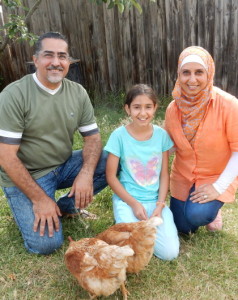Two time refugees just want to rebuild their lives
Majid Rezai and Nayran Tabai are refugees twice over.
In 2010, for the second time in their lives, the couple were forced to flee their home, leaving behind their possessions, friends, and established lives when the Damascus café they operated was bombed by Sunni rebels opposed to the brutal regime of Syrian President Bashar al Assed.

Majid Rezai and Nayran Tabai with daughter Alnour
A few years earlier they had owned a successful wedding catering and clothing business in Tehran, Majid’s home town.
But when local religious authorities objected to them allowing brides and grooms to meet under the same roof to decide on wedding arrangements, they were subject to a Sharia law ‘haram’ and banned from operating their business.
What’s more, the religious authorities seized their building and turned them into social and legal outcasts, forcing them to leave Iran for Syria.
The couple moved from to Nayran’s hometown Damascus in 2010 where they opened their restaurant.
“I lost my belongings, my life two times,” Majid said, speaking from his modest rented home in Melbourne’s western suburbs.
“It was terrible. We were living in an area of Damascus which the rebels were targeting. People were being killed and everything was destroyed,” said Majid, a qualified IT engineer.
Majid and Nayran sent their three sons to live with Majid’s mother in Tehran to avoid the conflict but kept their young daughter Alnour with them as they searched for a new place to settle down somewhere in the Middle East.
They tried Tajikistan, Turkey, Afghanistan, and even Bali but could not find anywhere safe that would accept them.
They applied for asylum in the US three times but were refused. The difficulty of their search for a new home was compounded because as an Iranian, every time he wanted to travel to another country Majid had to return to Iran.
“We could not return to Syria because of the fighting and if I go back to Iran I might end up in prison,” Majid said.
It was while the family was in Indonesia investigating the prospect of setting up a business there that they heard about the possibility of getting on a boat to Australia.
As refugees from Syria, they had registered themselves with the UN in Jakarta as asylum seekers but were told they faced a wait of three years before their claim could be processed.
Majid said it was a difficult decision to get on the boat but at the time they were faced with few alternatives.
“When we arrived in Jakarta the taxi drivers were asking us if we wanted to go to Australia. I wasn’t sure what they meant but it turned out they were not taxi drivers but people smugglers,” he said.
“They said to us ‘why wait three years, give me money and I’ll take you by boat’,” he said.
“We didn’t trust them at first and thought they might just rob us but then we met people who had relatives taken to Australia by the smugglers. So we decided to go.”
Majid said the three-day journey with 63 other people on a small fishing boat was hellish.
“It was a terrible journey – all the time I was vomiting. I spent three days beside the exhaust pipe breathing in fumes. But we were lucky. I heard stories of other boats that took much longer and had 200 people aboard,” he said.
“And of course some even sank,” Majid said.
The family reached Christmas Island in 2012 where they spent four months in detention before being transferred to another centre at Port Augusta, in South Australia.
They were released into the community in Melbourne at Easter in 2013 and were granted work rights in June this year.
Majid, who had been volunteering 15 hours a week at the local community hub, has now set up his own handyman business.
Nayran is a chef by training and an entrepreneur by nature. She now works casually as an interpreter and in a childcare centre after completing a diploma in child care. She has also set up a catering business.
She says she has worked since she was 15 and feels ashamed to take handouts from the government in the form of Centrelink benefits.
“It was hard in the beginning, I wanted to work but we were not allowed to and I feel ashamed that we were taking money from the government,” Nayran said.
“We want to work, we want to contribute and we are not afraid to work at anything,” she said.
Nayran is also worried about her three sons – now aged 19, 17, and 15 – living with Majid’s 74-year-old mother and who will soon be eligible for mandatory military service in Iran.
“I am afraid for them and I want to bring them to be with me here, so they are safe,” she said.
Nayran’s daughter Alnour, now nine, considers herself Australian. She speaks English with an Aussie accent and is frightened by the prospect of having to leave her school and her friends to return to the Middle East as the family waits to hear from the Immigration Department what their future will be after having applied for Temporary Protection Visas.
Majid says all he wants is the opportunity to rebuild his life for third time.
“Let me create my life, let me build it back up. I love it here,” he said.
Laurie Nowell
AMES Australia Senior Journalist












